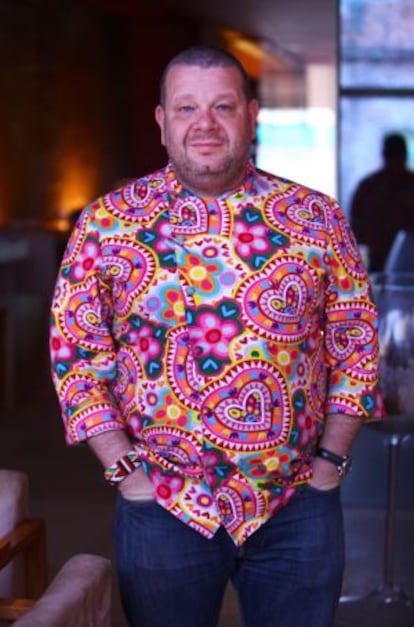The bad chef's worst nightmare
Alberto Chicote gets fired up to go all Gordon Ramsay on Spanish screens


Gordon Ramsay carved out a fiery reputation by hosting a television program called Kitchen Nightmares. It first aired in Britain in 2004, was successfully exported to the United States, and remains wildly popular in the English-speaking world. The show focuses on struggling restaurants that are about to go out of business; Ramsay rescues them through a combination of tough-guy attitude and personal experience. The famous chef does not refrain from using bad language and even worse manners on every episode, but it's all for a good cause: to save the floundering business, or in Ramsay's own words, "to save the owner's ass."
Now, a chef from Madrid named Alberto Chicote is getting ready to emulate Ramsay in an adaptation that will air in September on laSexta. Translated directly as Pesadilla en la cocina, the show's producers are still selecting restaurants, but things are going "full steam ahead" in order to make it in time for the fall programming, says Chicote.
Although his rotund exterior and vehement style make Chicote seem like a tough guy at first glance, he is in fact a sensitive individual who likes to share his gastronomic and photographic experiences with his friends, who include fellow Madrid chefs Paco Roncero, Joaquín Felipe and Sacha Hormaechea.
But there is little doubt that it was his appearance - think of a bear about to pounce - that seduced network producers. The new star of the show warns: "We're going to kick ass, because it's all about refloating a business. [...] I don't care if I get a bad reputation from this. Gordon Ramsay is not an unmerciful bastard. What he's done on Kitchen Nightmares is to give back restaurant managers their passion for what they do, and you can't do that just by back-patting," says Chicote. "Viewers are going to see places where they would not want to go for dinner, but which can be honest about their problems and change for the better. Disastrous restaurants can turn into role models for others, given a change of direction."
"Pesadilla en la cocina is not just a show, it's very real," the chef goes on. "There's a whole consulting job going on there, with a good team behind it."
For the former head of restaurants like No-Do and Pan de Lujo, going down to street level is nothing new. Chicote, now 43, has been in the food trade since the age of 17, climbing the culinary ladder at various restaurants (El Cenachero, Lúculo, Sibaris, La Recoleta) until he eventually opened his own businesses.
"I've been cooking longer than I've been doing anything else, and I want to keep it that way. I'm a guy who sinks his teeth into life's pleasures and drives his fists into life's problems," he proclaims on his Facebook profile. His attitude on the set will follow along the same lines: "You cannot be condescending with slovenliness."
Despite the threatening tones, many restaurants are lining up to appear on the show's first 10 episodes. According to Chicote, there are applications coming in from all over Spain, both large cities and small towns. Their owners do not mind letting millions of people in on their secrets, as long as it helps them stay afloat.
"Being on TV is a chance to get out of the hole," after all. The chef explains that many people are convinced that they are doing things right, and cannot understand why their business does not work. "They are mired in their own mistakes, and cannot see any further. Besides telling them off, you also want to pull them out of their inertia. They've gone down to hell and you need to shake them in order to get them out of there. They have a week to get their act together and improve their facilities, their menu, their employee organization... In season two we will see whether they've done their homework or whether they're back to square one."







































